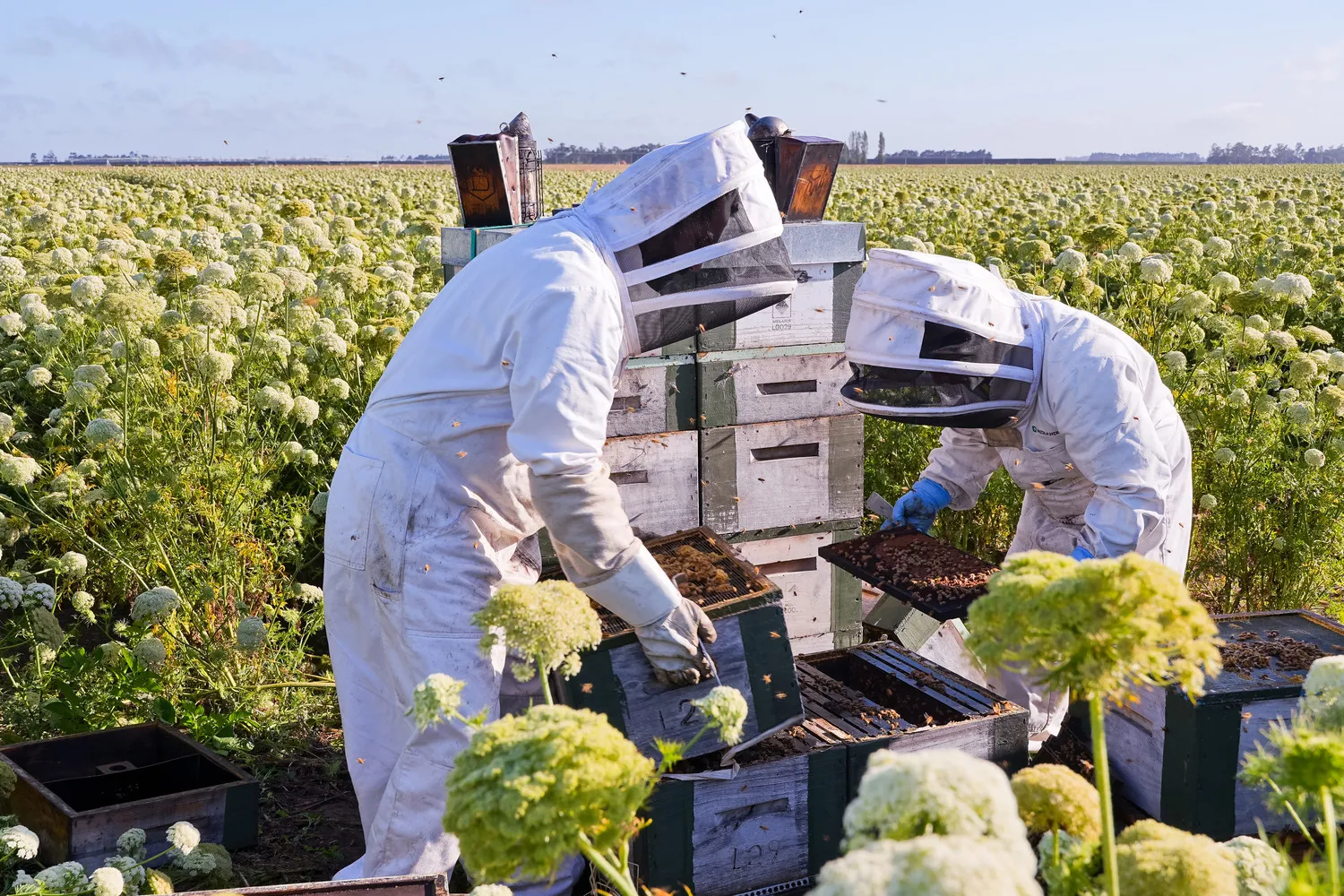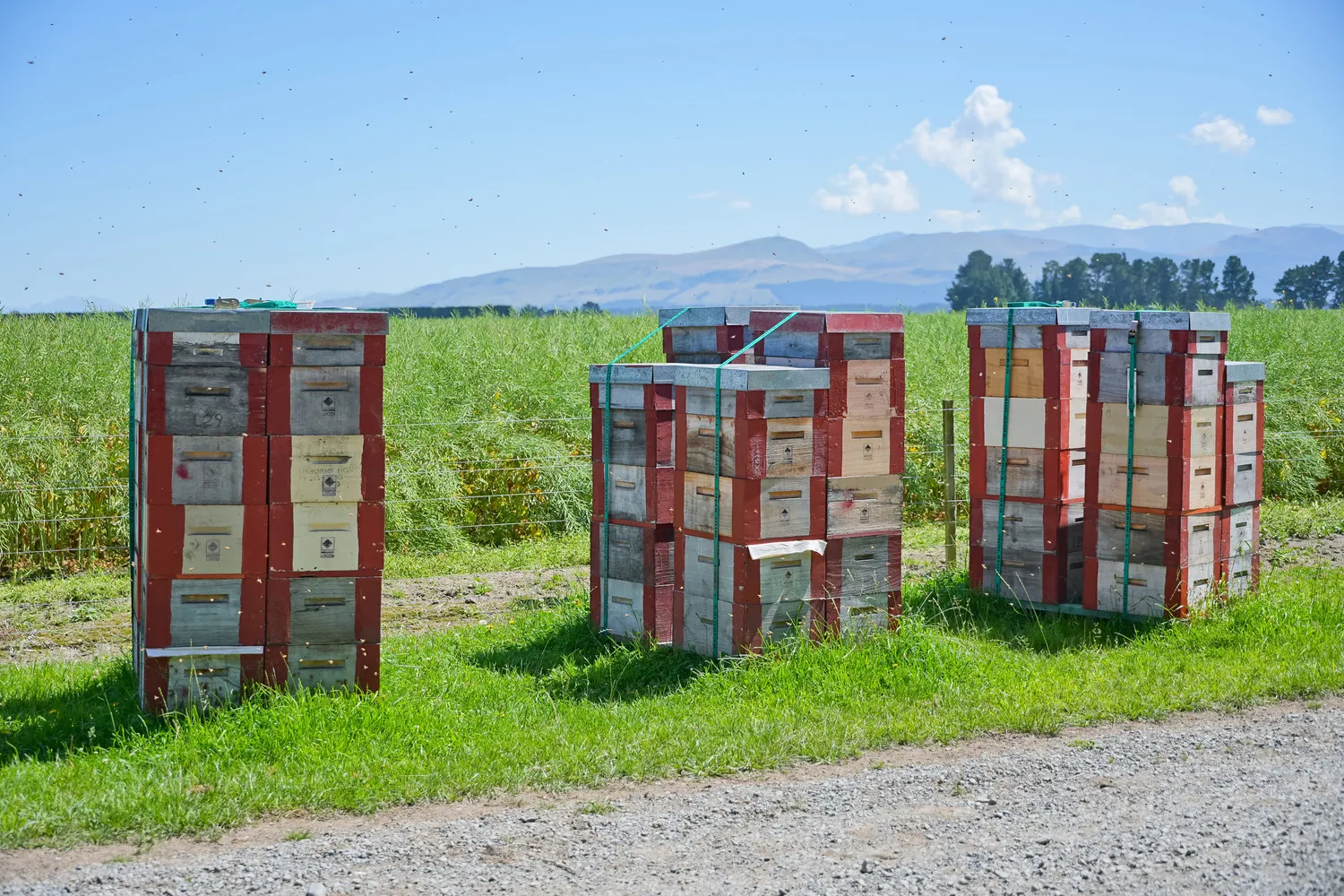

overview
What we do
Midlands Bees provides expert pollination services that support high value seed and fruit crops across Canterbury, backed by deep research and industry leading hive management. With more than seven thousand hives and strict quality systems, we help growers achieve stronger yields, reliable pollination, and better crop performance.
Pollination Services in Canterbury
Our crop pollination services build long term, mutually beneficial relationships between arable growers, horticulturalist, and ourselves. Our services enable New Zealand to produce specialty seed crops and fruit that can compete in the global market and contribute to the success of New Zealand's seed industry. We are pollination experts providing services to maximise your crops providing you with the following skills and experience;
- Extensive experience and expertise in specialist seed crops and pollination.
- Strict observance to on farm Health and Safety requirements.
- One of the South Islands largest beekeeping operation.
- Experience in shifting hives on and off crops.
- Beekeeping that provides certainty and reliability for the pollination of high value crops.
- Extensive Research and Development programmes focusing on bee health, hive management, pollination optimisation and hive tracking and compliance.
- Vigilant compliance and certification systems, working to the strictest biosecurity and international standard.
At Midlands Bees, we aim to exceed expectations and set new standards of excellence in pollination services within New Zealand. Providing around 7,000 beehives for natural and efficient pollination of specialty seed and fruit crops throughout Canterbury, we provide pollination services for crops including, but not limited to;
- Canola
- Radish
- Carrots
- Clover
- Brassicas
- Parsnip
- Borage
- Parsley
- Blackcurrants
- Chicory
Beehives are required for pollination between the months of October and February, then the beehives are returned to the resident site for wintering. Major demand for our pollination services is on hybrid carrots from mid-December to mid-February.
Why do we need bees?
The honey bee one of the most important pollinators for New Zealand farmers. They do an important job to support crop yields. Globally, bees are the most important pollinator for crop cultivation. Management strategies such as placement at the right times and removal when finished or movement to another crop or field position, gives bees a strong advantage.
What bee species do we have in New Zealand?
There are a range of bee species in New Zealand, including the western honeybee (apis mellifera), bumble bees, leafcutter bees, and alkali bees which support crop pollination.
The western honeybee is the most popular managed pollinator for many reasons including their crop versatility, bee abundance in colonies. Bumbles bees on the other hand, can also be good wild pollinators for crops offering bee diversity, as they are more resilient to weather than bees and can be less aggressive than bees, however their small colony sizes and price in New Zealand make them less favourable than bees.
Why not rely on Wild Pollinators?
Other wild pollinators include birds, flies, and bumblebees; however, these are usually only suitable for specific crops or are less efficient than honey bees. Natural bee communities (or feral bee colonies) can also support pollination efforts. Living in trees, buildings, caves or ma-made structures, feral colonies can significantly increase pollination if their population is large enough. However, knowing if their population could sustain pollination is difficult to assess until after the crop has flowered, which will likely be too late to introduce a managed bee colony.
Bee abundance is essential to the pollination of crops. Managed beehives can assess agricultural landscapes, and be moved to ensure that pollination is maximised, whereas feral bee colonies can not be moved, reducing their pollination efficiency. The wild bee can be a great resource for pollination but should not be relied upon where bee abundance is required to deliver crop results.
Pollination Research
Midlands undertakes a variety of research programmes to identify new and more efficient crop pollination methods. This research supports local farmers to produce better quality and higher yielding crops.
Contract Honey Extraction
Midlands Bees has a dedicated honey extraction facility with state of the art extraction equipment including a centrifuge. Alongside extracting our own honey, contract extraction services are available.
Quality Assurance
To meet production standards and customer requirements, we are focused on a high-quality production process and the highest quality assurance standards. Our purpose-built extraction facility operates a HACCP based Risk Management Programme (RMP) and is a certified SQF food production facility, licensed and inspected by New Zealand's Ministry of Primary Industry (MPI).
Our certifications mean you can rest easy your hand is in good hands. To ensure your honey leaves at a higher standard than when it arrived, we ensure we are compliance to a range of domestic and international quality certifications including;
- HACCP
- RMP
- SQF
- National Food Safety Programme
What is Contract Honey Extraction?
Contract honey extraction is the process in which a beekeeper contracts a facility to remove the honey from their hives. The honey is stored in the frames of the hives, and using specialist equipment, we are able to remove the maximum amount of honey. Honey is then carefully filtered to remove any wax and other particles.
Why do you need a Contract Honey Extraction?
A contract extractor takes the mess and fuss away from extracting your honey. Some beekeepers prefer to extract their own honey, but if you have a few hives, or are short of time, a contract honey extractor can help. Whether your honey is for you and your family, or you sell your own honey brand, our honey extraction services can help you.
Contact us if you need Honey Extraction services
If you are a local beekeeper in the Canterbury region, Midlands Bees can offer you a contract extraction services for your beehives. Our dedicated team can extract honey from your hives and fill it into pails, drums or IBC. Minimum quantities apply and early bookings are recommended.
Queen Bees for Sale
Midlands Bees have a large focus on producing high quality queens using premium Betta Bees genetics. This is to ensure that all our production hives have quality queens to ensure that we get optimal pollination performance and honey production.
Midlands are a shareholder in Betta Bees Research Ltd as well as a commercial partner in the FutureBees NZ program run by the University of Otago and AbacusBio.
Our team are dedicated to queen rearing, with specialist staff who raise queens from larvae. We have a small number of queen cells for sale in the spring and autumn and a limited number of overwintered queens for sale in spring. For more information or to purchase please contact us.
Contact us
We look forward to hearing from you.
Direct Contacts










